The Cambridge History of China. Vol. 12: Republican China, 1912-1949, Part 1
Подождите немного. Документ загружается.

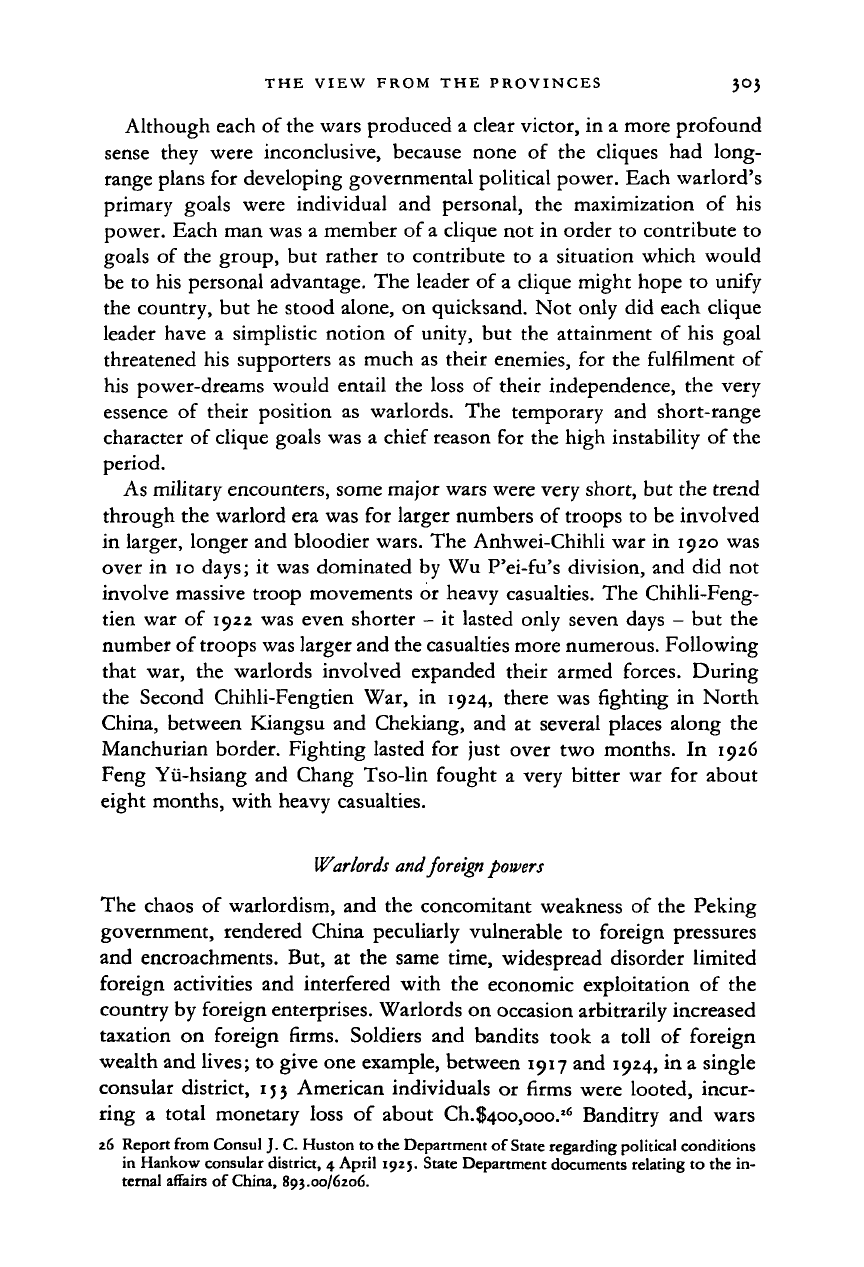
THE VIEW FROM THE PROVINCES 303
Although each of the wars produced a clear victor, in a more profound
sense they were inconclusive, because none of the cliques had long-
range plans for developing governmental political power. Each warlord's
primary goals were individual and personal, the maximization of his
power. Each man was a member of a clique not in order to contribute to
goals of the group, but rather to contribute to a situation which would
be to his personal advantage. The leader of a clique might hope to unify
the country, but he stood alone, on quicksand. Not only did each clique
leader have a simplistic notion of unity, but the attainment of his goal
threatened his supporters as much as their enemies, for the fulfilment of
his power-dreams would entail the loss of their independence, the very
essence of their position as warlords. The temporary and short-range
character of clique goals was a chief reason for the high instability of the
period.
As military encounters, some major wars were very short, but the trend
through the warlord era was for larger numbers of troops to be involved
in larger, longer and bloodier wars. The Anhwei-Chihli war in 1920 was
over in 10 days; it was dominated by Wu P'ei-fu's division, and did not
involve massive troop movements or heavy casualties. The Chihli-Feng-
tien war of 1922 was even shorter - it lasted only seven days - but the
number of troops was larger and the casualties more numerous. Following
that war, the warlords involved expanded their armed forces. During
the Second Chihli-Fengtien War, in 1924, there was fighting in North
China, between Kiangsu and Chekiang, and at several places along the
Manchurian border. Fighting lasted for just over two months. In 1926
Feng Yii-hsiang and Chang Tso-lin fought a very bitter war for about
eight months, with heavy casualties.
Warlords and foreign powers
The chaos of warlordism, and the concomitant weakness of the Peking
government, rendered China peculiarly vulnerable to foreign pressures
and encroachments. But, at the same time, widespread disorder limited
foreign activities and interfered with the economic exploitation of the
country by foreign enterprises. Warlords on occasion arbitrarily increased
taxation on foreign firms. Soldiers and bandits took a toll of foreign
wealth and lives; to give one example, between 1917 and 1924, in a single
consular district, 15} American individuals or firms were looted, incur-
ring a total monetary loss of about Ch. $400,000.
l6
Banditry and wars
26 Report from Consul J. C. Huston to the Department of State regarding political conditions
in Hankow consular district, 4 April 1925. State Department documents relating to the in-
ternal affairs of China, 893.00/6206.
Cambridge Histories Online © Cambridge University Press, 2008
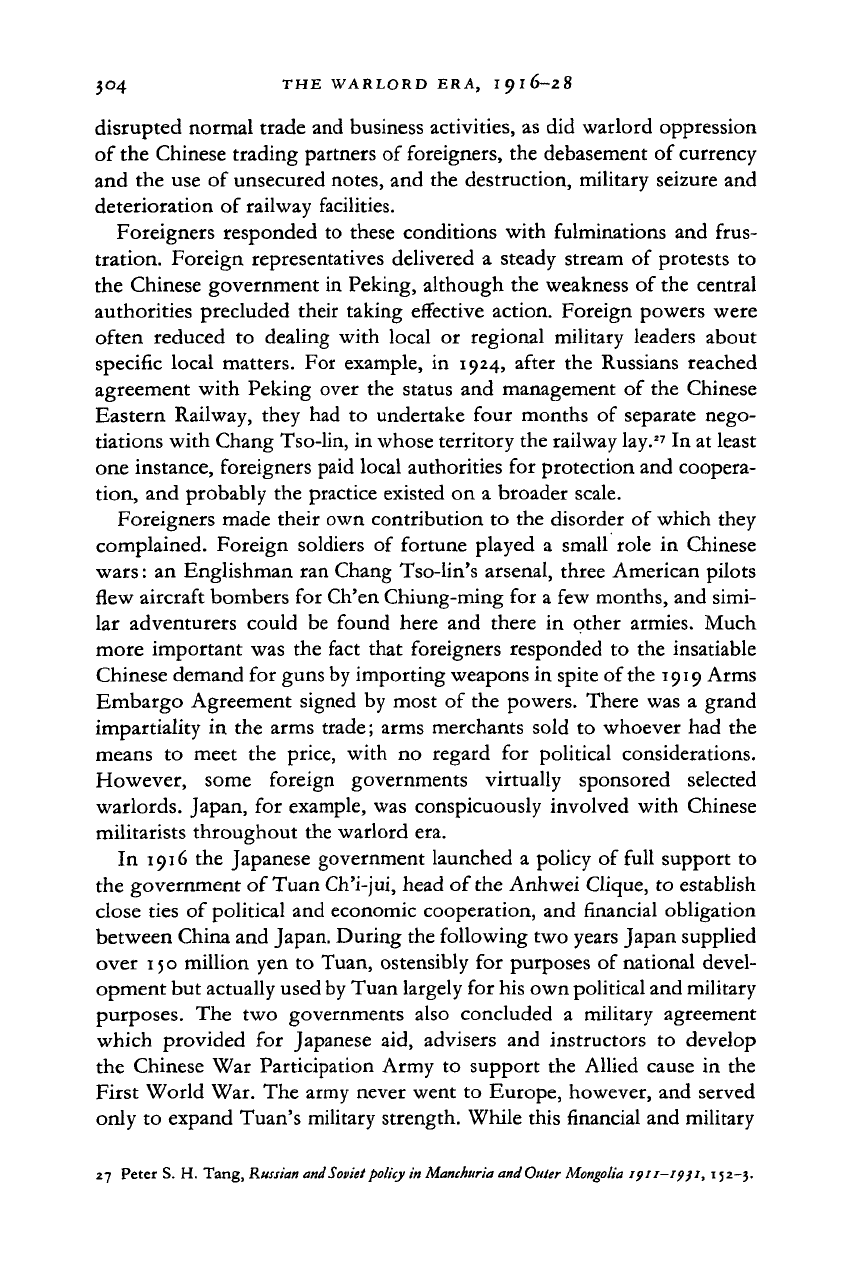
304 THE
WARLORD
ERA, I 9 I 6-2 8
disrupted normal trade and business activities, as did warlord oppression
of the Chinese trading partners of foreigners, the debasement of currency
and the use of unsecured notes, and the destruction, military seizure and
deterioration of railway facilities.
Foreigners responded to these conditions with fulminations and frus-
tration. Foreign representatives delivered a steady stream of protests to
the Chinese government in Peking, although the weakness of the central
authorities precluded their taking effective action. Foreign powers were
often reduced to dealing with local or regional military leaders about
specific local matters. For example, in 1924, after the Russians reached
agreement with Peking over the status and management of the Chinese
Eastern Railway, they had to undertake four months of separate nego-
tiations with Chang Tso-lin, in whose territory the railway lay.
27
In at least
one instance, foreigners paid local authorities for protection and coopera-
tion, and probably the practice existed on a broader scale.
Foreigners made their own contribution to the disorder of which they
complained. Foreign soldiers of fortune played a small role in Chinese
wars:
an Englishman ran Chang Tso-lin's arsenal, three American pilots
flew aircraft bombers for Ch'en Chiung-ming for a few months, and simi-
lar adventurers could be found here and there in other armies. Much
more important was the fact that foreigners responded to the insatiable
Chinese demand for guns by importing weapons in spite of the 1919 Arms
Embargo Agreement signed by most of the powers. There was a grand
impartiality in the arms trade; arms merchants sold to whoever had the
means to meet the price, with no regard for political considerations.
However, some foreign governments virtually sponsored selected
warlords. Japan, for example, was conspicuously involved with Chinese
militarists throughout the warlord era.
In 1916 the Japanese government launched a policy of full support to
the government of Tuan Ch'i-jui, head of the Anhwei Clique, to establish
close ties of political and economic cooperation, and financial obligation
between China and Japan. During the following two years Japan supplied
over 150 million yen to Tuan, ostensibly for purposes of national devel-
opment but actually used by Tuan largely for his own political and military
purposes. The two governments also concluded a military agreement
which provided for Japanese aid, advisers and instructors to develop
the Chinese War Participation Army to support the Allied cause in the
First World War. The army never went to Europe, however, and served
only to expand Tuan's military strength. While this financial and military
27 Peter S. H. Tang, Russian and Soviet policy in
Manchuria
and
Outer Mongolia
1911-1931,
152-3.
Cambridge Histories Online © Cambridge University Press, 2008
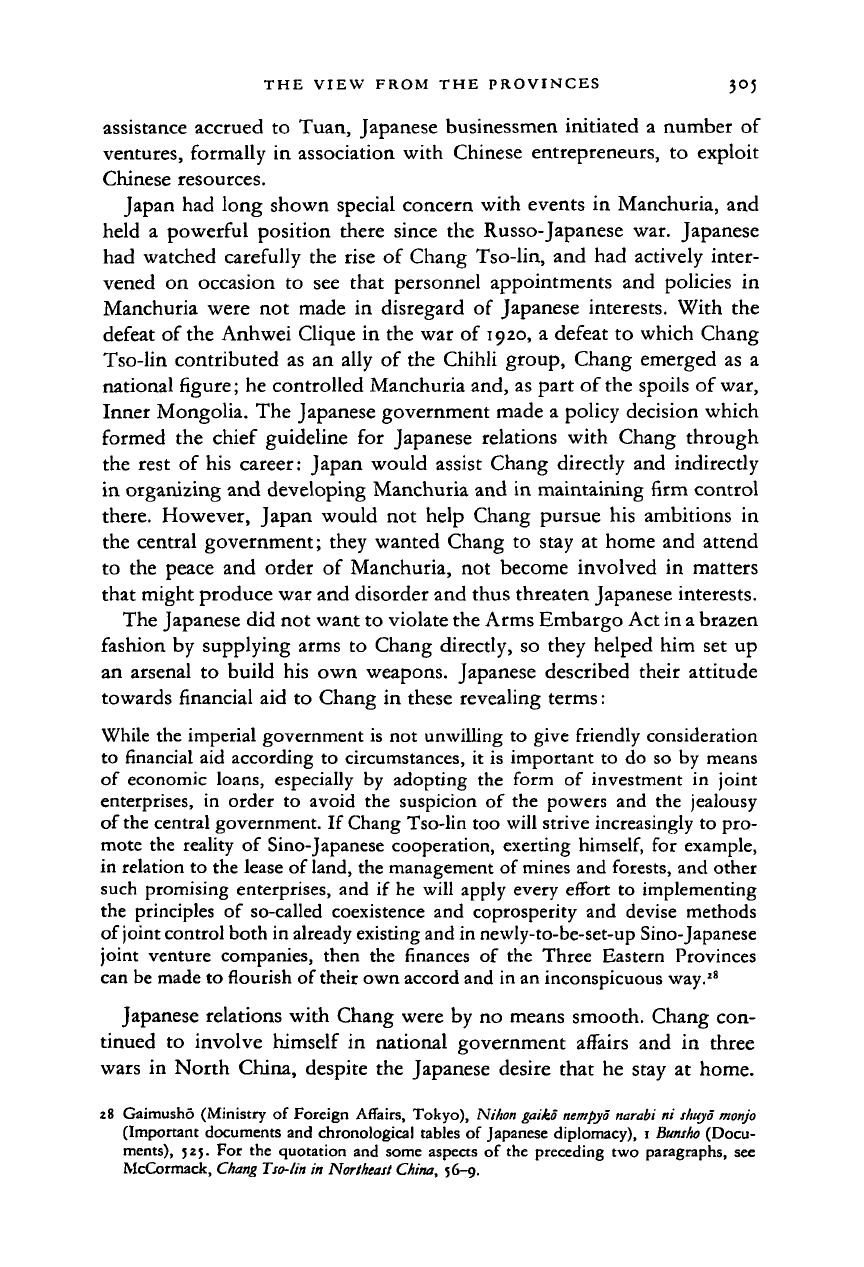
THE VIEW FROM THE PROVINCES 305
assistance accrued to Tuan, Japanese businessmen initiated a number of
ventures, formally in association with Chinese entrepreneurs, to exploit
Chinese resources.
Japan had long shown special concern with events in Manchuria, and
held a powerful position there since the Russo-Japanese war. Japanese
had watched carefully the rise of Chang Tso-lin, and had actively inter-
vened on occasion to see that personnel appointments and policies in
Manchuria were not made in disregard of Japanese interests. With the
defeat of the Anhwei Clique in the war of 1920, a defeat to which Chang
Tso-lin contributed as an ally of the Chihli group, Chang emerged as a
national figure; he controlled Manchuria and, as part of the spoils of war,
Inner Mongolia. The Japanese government made a policy decision which
formed the chief guideline for Japanese relations with Chang through
the rest of his career: Japan would assist Chang directly and indirectly
in organizing and developing Manchuria and in maintaining firm control
there. However, Japan would not help Chang pursue his ambitions in
the central government; they wanted Chang to stay at home and attend
to the peace and order of Manchuria, not become involved in matters
that might produce war and disorder and thus threaten Japanese interests.
The Japanese did not want to violate the Arms Embargo Act in a brazen
fashion by supplying arms to Chang directly, so they helped him set up
an arsenal to build his own weapons. Japanese described their attitude
towards financial aid to Chang in these revealing terms:
While the imperial government is not unwilling to give friendly consideration
to
financial
aid according to circumstances, it is important to do so by means
of economic loans, especially by adopting the form of investment in joint
enterprises, in order to avoid the suspicion of the powers and the jealousy
of
the
central government. If Chang Tso-lin too will strive increasingly to pro-
mote the reality of Sino-Japanese cooperation, exerting
himself,
for example,
in relation to the lease of
land,
the management of mines and forests, and other
such promising enterprises, and if he will apply every effort to implementing
the principles of so-called coexistence and coprosperity and devise methods
of joint control both in already existing and in newly-to-be-set-up Sino-Japanese
joint venture companies, then the finances of the Three Eastern Provinces
can be made to
flourish
of their own accord and in an inconspicuous way.
28
Japanese relations with Chang were by no means smooth. Chang con-
tinued to involve himself in national government affairs and in three
wars in North China, despite the Japanese desire that he stay at home.
28 Gaimusho (Ministry of Foreign Affairs, Tokyo), Nihon gaiko nempyo narabi ni
shuyo
monjo
(Important documents and chronological tables of Japanese diplomacy), 1
Buns/10
(Docu-
ments),
525. For the quotation and some aspects of the preceding two paragraphs, see
McCormack, Chang Tso-lin in Northeast China, 56-9.
Cambridge Histories Online © Cambridge University Press, 2008
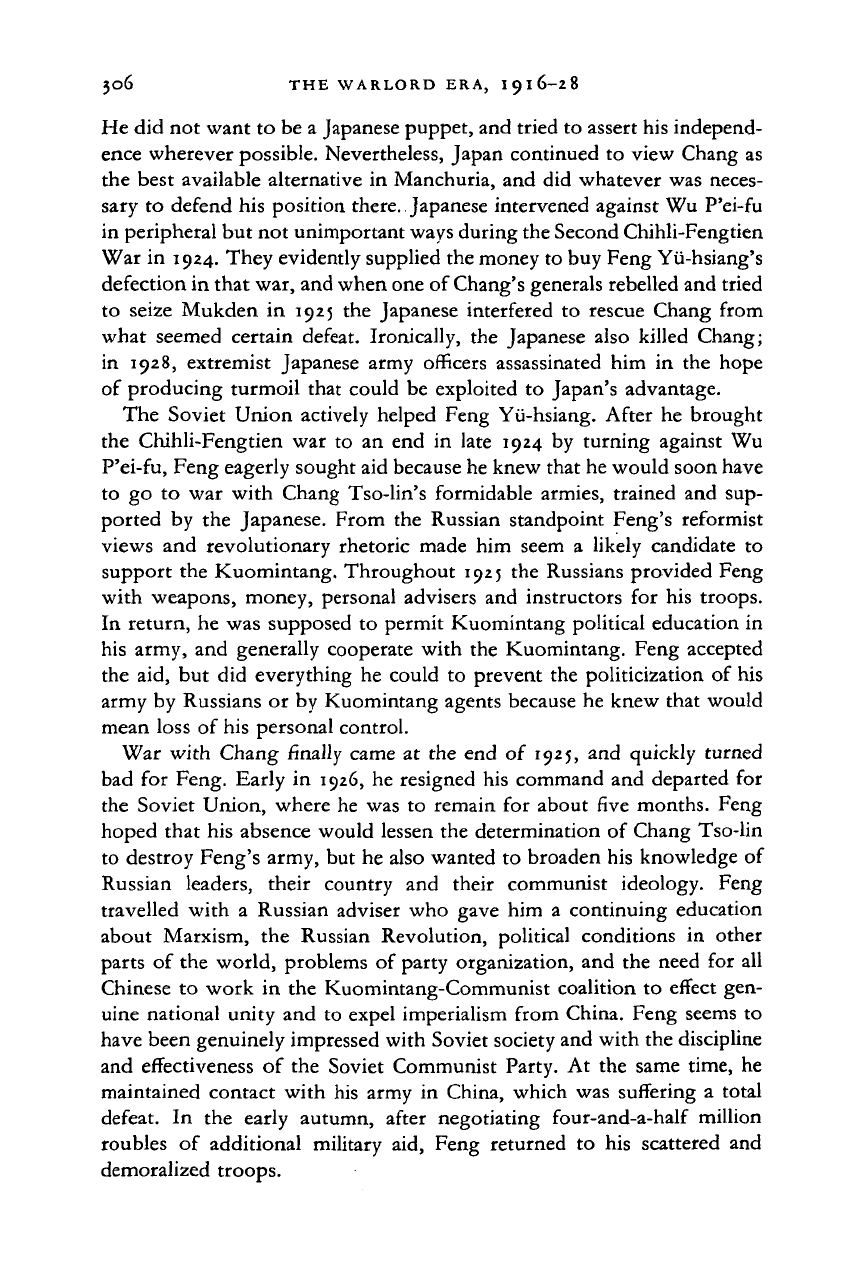
306 THE WARLORD ERA, I 9 I 6-2 8
He did not want to be a Japanese puppet, and tried to assert his independ-
ence wherever possible. Nevertheless, Japan continued to view Chang as
the best available alternative in Manchuria, and did whatever was neces-
sary to defend his position there. Japanese intervened against Wu P'ei-fu
in peripheral but not unimportant ways during the Second Chihli-Fengtien
War in 1924. They evidently supplied the money to buy Feng Yii-hsiang's
defection in that war, and when one of Chang's generals rebelled and tried
to seize Mukden in 1925 the Japanese interfered to rescue Chang from
what seemed certain defeat. Ironically, the Japanese also killed Chang;
in 1928, extremist Japanese army officers assassinated him in the hope
of producing turmoil that could be exploited to Japan's advantage.
The Soviet Union actively helped Feng Yii-hsiang. After he brought
the Chihli-Fengtien war to an end in late 1924 by turning against Wu
P'ei-fu, Feng eagerly sought aid because he knew that he would soon have
to go to war with Chang Tso-lin's formidable armies, trained and sup-
ported by the Japanese. From the Russian standpoint Feng's reformist
views and revolutionary rhetoric made him seem a likely candidate to
support the Kuomintang. Throughout 1925 the Russians provided Feng
with weapons, money, personal advisers and instructors for his troops.
In return, he was supposed to permit Kuomintang political education in
his army, and generally cooperate with the Kuomintang. Feng accepted
the aid, but did everything he could to prevent the politicization of his
army by Russians or by Kuomintang agents because he knew that would
mean loss of his personal control.
War with Chang finally came at the end of 1925, and quickly turned
bad for Feng. Early in 1926, he resigned his command and departed for
the Soviet Union, where he was to remain for about five months. Feng
hoped that his absence would lessen the determination of Chang Tso-lin
to destroy Feng's army, but he also wanted to broaden his knowledge of
Russian leaders, their country and their communist ideology. Feng
travelled with a Russian adviser who gave him a continuing education
about Marxism, the Russian Revolution, political conditions in other
parts of the world, problems of party organization, and the need for all
Chinese to work in the Kuomintang-Communist coalition to effect gen-
uine national unity and to expel imperialism from China. Feng seems to
have been genuinely impressed with Soviet society and with the discipline
and effectiveness of the Soviet Communist Party. At the same time, he
maintained contact with his army in China, which was suffering a total
defeat. In the early autumn, after negotiating four-and-a-half million
roubles of additional military aid, Feng returned to his scattered and
demoralized troops.
Cambridge Histories Online © Cambridge University Press, 2008
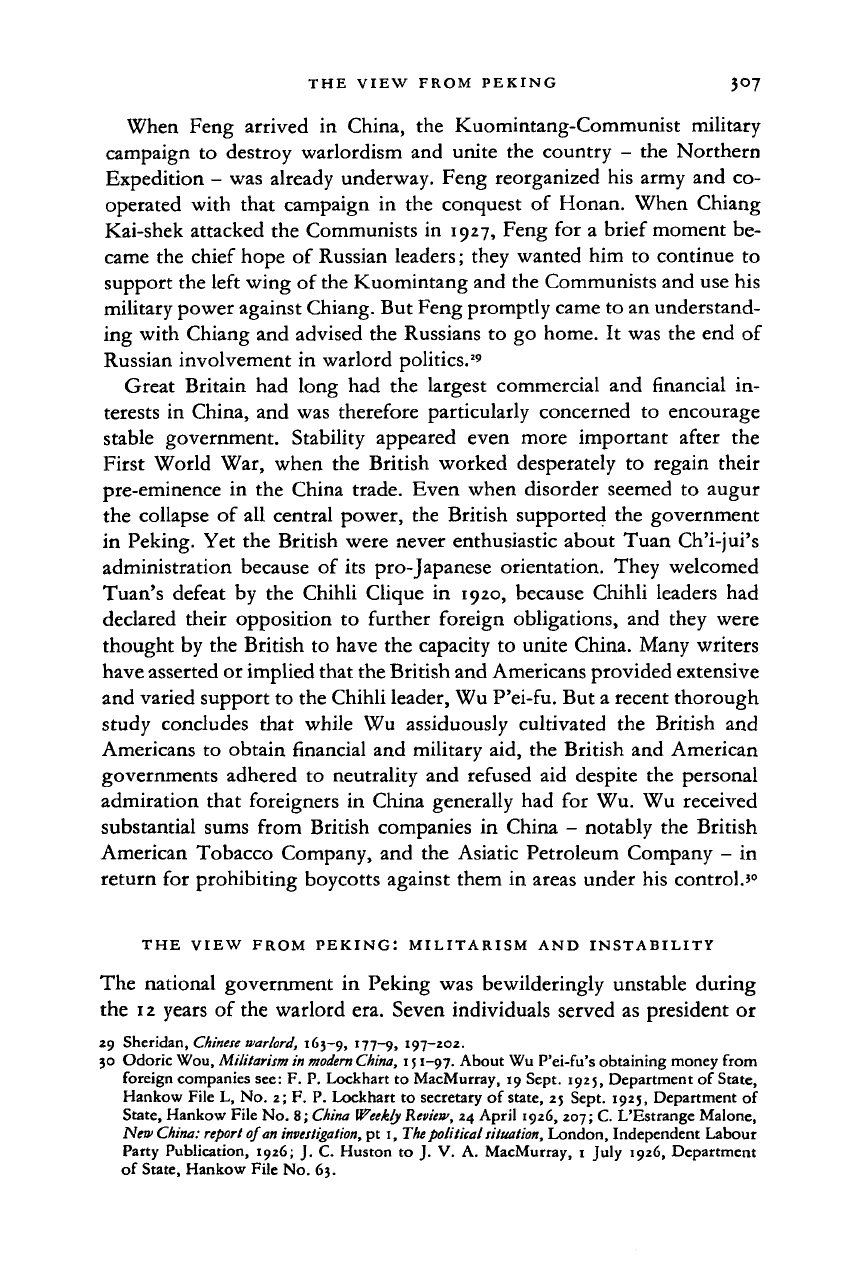
THE VIEW FROM PEKING 307
When Feng arrived
in
China,
the
Kuomintang-Communist military
campaign
to
destroy warlordism
and
unite
the
country
-
the
Northern
Expedition
-
was
already underway. Feng reorganized
his
army
and co-
operated with that campaign
in
the
conquest
of
Honan. When Chiang
Kai-shek attacked
the
Communists
in 1927,
Feng
for
a
brief moment
be-
came
the
chief hope
of
Russian leaders; they wanted
him
to
continue
to
support
the
left wing
of
the Kuomintang
and the
Communists
and use his
military power against Chiang.
But
Feng promptly came
to an
understand-
ing with Chiang
and
advised
the
Russians
to
go
home.
It
was the end of
Russian involvement
in
warlord politics.
29
Great Britain
had
long
had the
largest commercial
and
financial
in-
terests
in
China,
and was
therefore particularly concerned
to
encourage
stable government. Stability appeared even more important after
the
First World
War,
when
the
British worked desperately
to
regain their
pre-eminence
in
the
China trade. Even when disorder seemed
to
augur
the collapse
of
all
central power,
the
British supported
the
government
in Peking.
Yet the
British were never enthusiastic about Tuan Ch'i-jui's
administration because
of
its
pro-Japanese orientation. They welcomed
Tuan's defeat
by the
Chihli Clique
in
1920,
because Chihli leaders
had
declared their opposition
to
further foreign obligations,
and
they were
thought
by the
British
to
have
the
capacity
to
unite China. Many writers
have asserted
or
implied that the British
and
Americans provided extensive
and varied support
to the
Chihli leader,
Wu
P'ei-fu.
But a
recent thorough
study concludes that while
Wu
assiduously cultivated
the
British
and
Americans
to
obtain financial
and
military
aid, the
British
and
American
governments adhered
to
neutrality
and
refused
aid
despite
the
personal
admiration that foreigners
in
China generally
had
for
Wu. Wu
received
substantial sums from British companies
in
China
-
notably
the
British
American Tobacco Company,
and the
Asiatic Petroleum Company
- in
return
for
prohibiting boycotts against them
in
areas under
his
control.'
0
THE VIEW FROM PEKING: MILITARISM AND INSTABILITY
The national government
in
Peking
was
bewilderingly unstable during
the
12
years
of
the
warlord
era.
Seven individuals served
as
president
or
29 Sheridan,
Chinese
warlord,
163-9, *77"~9» 197-202.
30 Odoric Wou, Militarism in
modern
China,
151-97. About Wu P'ei-fu's obtaining money from
foreign companies see:
F. P.
Lockhart
to
MacMurray, 19 Sept. 1925, Department
of
State,
Hankow File
L,
No.
2; F. P.
Lockhart
to
secretary
of
state, 25 Sept. 1925, Department
of
State, Hankow File No. 8;
China Weekly
Review,
24 April 1926, 207; C. L'Estrange Malone,
N«J<
China: report of an
investigation,
pt
1,
The political
situation,
London, Independent Labour
Party Publication, 1926;
J. C.
Huston
to J. V. A.
MacMurray,
1
July 1926, Department
of State, Hankow File No. 63.
Cambridge Histories Online © Cambridge University Press, 2008
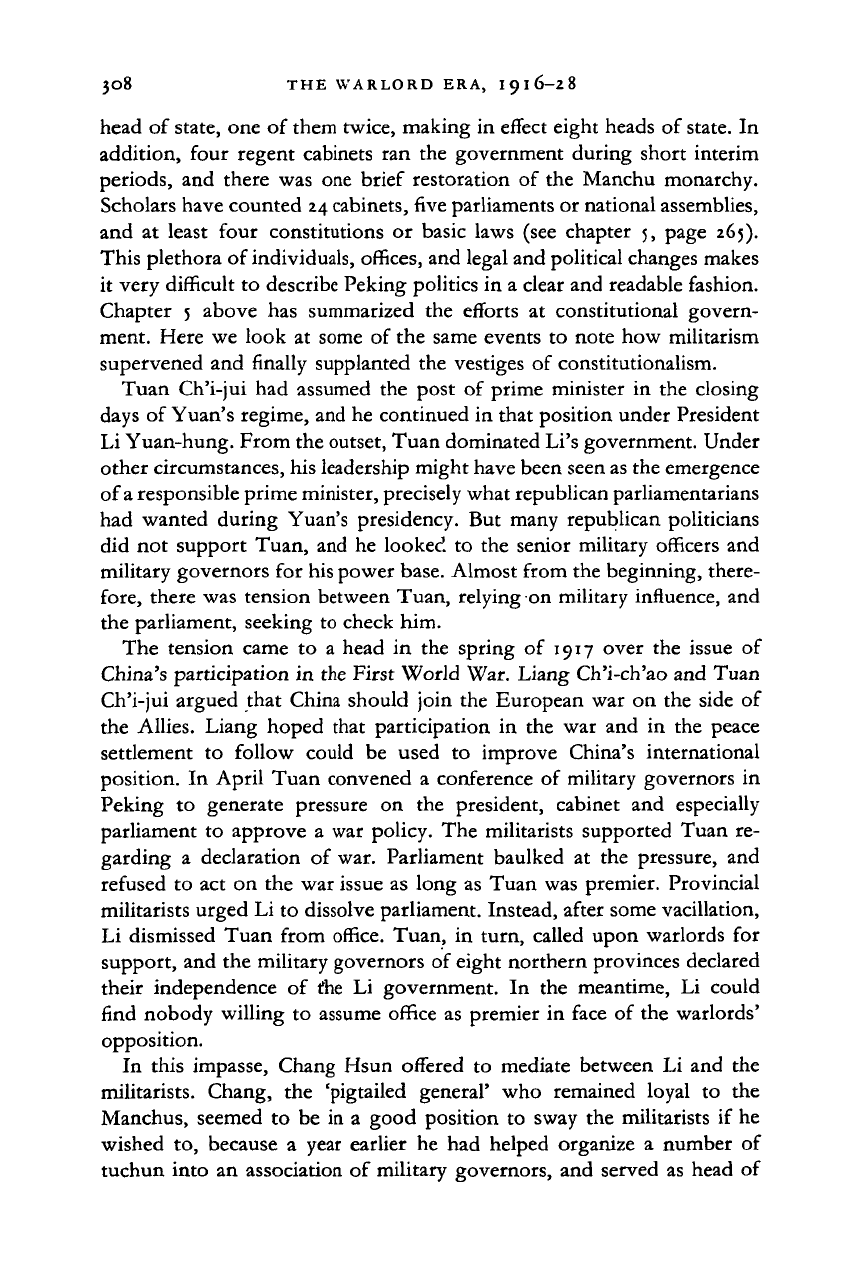
308 THE WARLORD ERA, I 9 I 6-2 8
head of state, one of them twice, making in effect eight heads of state. In
addition, four regent cabinets ran the government during short interim
periods, and there was one brief restoration of the Manchu monarchy.
Scholars have counted
24
cabinets, five parliaments or national assemblies,
and at least four constitutions or basic laws (see chapter 5, page 265).
This plethora of
individuals,
offices, and legal and political changes makes
it very difficult to describe Peking politics in a clear and readable fashion.
Chapter 5 above has summarized the efforts at constitutional govern-
ment. Here we look at some of the same events to note how militarism
supervened and finally supplanted the vestiges of constitutionalism.
Tuan Ch'i-jui had assumed the post of prime minister in the closing
days of Yuan's regime, and he continued in that position under President
Li Yuan-hung. From the outset, Tuan dominated Li's government. Under
other circumstances, his leadership might have been seen as the emergence
of a responsible prime minister, precisely what republican parliamentarians
had wanted during Yuan's presidency. But many republican politicians
did not support Tuan, and he looked to the senior military officers and
military governors for his power base. Almost from the beginning, there-
fore,
there was tension between Tuan, relying on military influence, and
the parliament, seeking to check him.
The tension came to a head in the spring of 1917 over the issue of
China's participation in the First World War. Liang Ch'i-ch'ao and Tuan
Ch'i-jui argued that China should join the European war on the side of
the Allies. Liang hoped that participation in the war and in the peace
settlement to follow could be used to improve China's international
position. In April Tuan convened a conference of military governors in
Peking to generate pressure on the president, cabinet and especially
parliament to approve a war policy. The militarists supported Tuan re-
garding a declaration of war. Parliament baulked at the pressure, and
refused to act on the war issue as long as Tuan was premier. Provincial
militarists urged Li to dissolve parliament. Instead, after some vacillation,
Li dismissed Tuan from office. Tuan, in turn, called upon warlords for
support, and the military governors of eight northern provinces declared
their independence of the Li government. In the meantime, Li could
find nobody willing to assume office as premier in face of the warlords'
opposition.
In this impasse, Chang Hsun offered to mediate between Li and the
militarists. Chang, the 'pigtailed general' who remained loyal to the
Manchus, seemed to be in a good position to sway the militarists if he
wished to, because a year earlier he had helped organize a number of
tuchun into an association of military governors, and served as head of
Cambridge Histories Online © Cambridge University Press, 2008
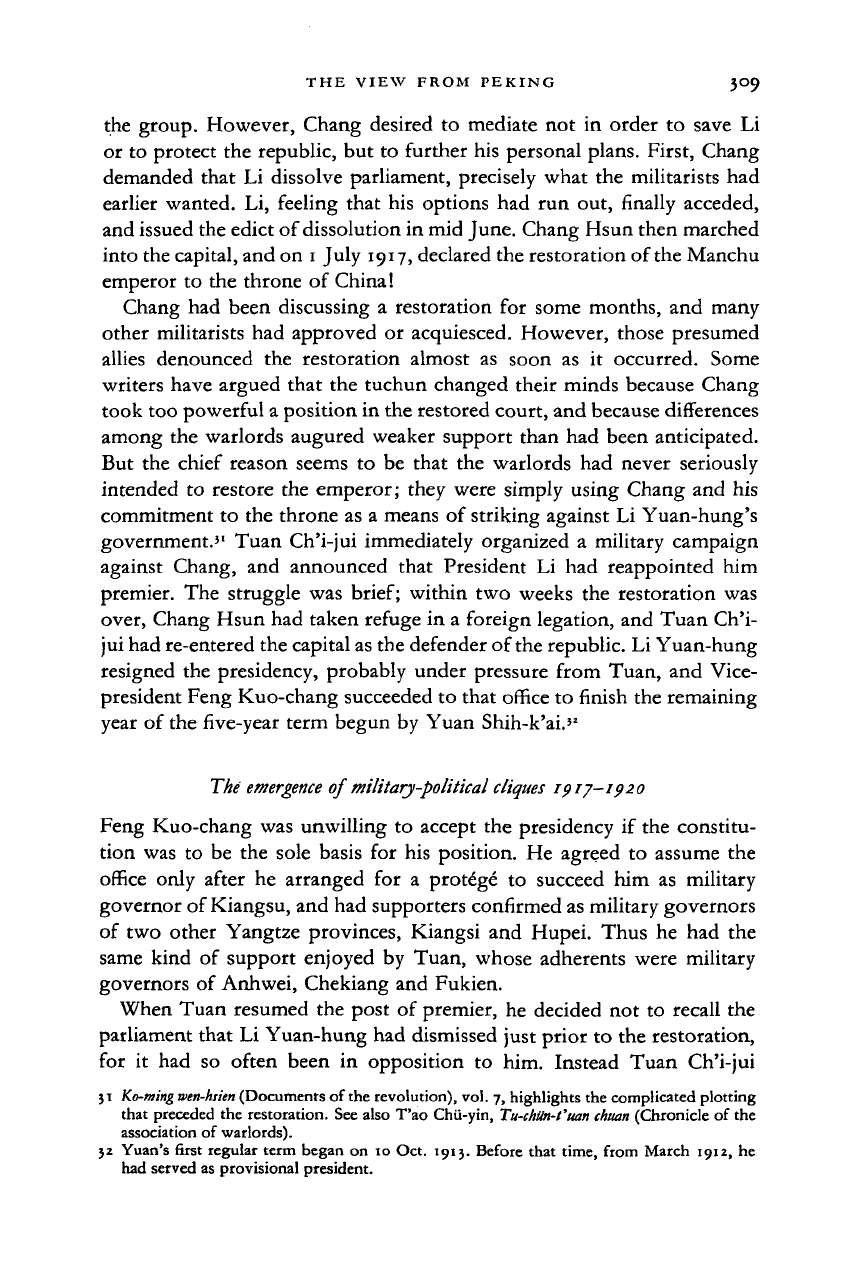
THE VIEW FROM PEKING 309
the group. However, Chang desired
to
mediate
not
in
order
to
save
Li
or
to
protect
the
republic,
but to
further
his
personal plans. First, Chang
demanded that
Li
dissolve parliament, precisely what
the
militarists
had
earlier wanted.
Li,
feeling that
his
options
had run out,
finally acceded,
and issued
the
edict
of
dissolution
in mid
June. Chang Hsun then marched
into
the
capital,
and on
i
July 1917, declared
the
restoration
of
the
Manchu
emperor
to the
throne
of
China!
Chang
had
been discussing
a
restoration
for
some months,
and
many
other militarists
had
approved
or
acquiesced. However, those presumed
allies denounced
the
restoration almost
as
soon
as it
occurred. Some
writers have argued that
the
tuchun changed their minds because Chang
took
too
powerful
a
position
in
the restored court,
and
because differences
among
the
warlords augured weaker support than
had
been anticipated.
But
the
chief reason seems
to be
that
the
warlords
had
never seriously
intended
to
restore
the
emperor; they were simply using Chang
and his
commitment
to the
throne
as a
means
of
striking against
Li
Yuan-hung's
government.'
1
Tuan Ch'i-jui immediately organized
a
military campaign
against Chang,
and
announced that President
Li had
reappointed
him
premier.
The
struggle
was brief;
within
two
weeks
the
restoration
was
over, Chang Hsun
had
taken refuge
in a
foreign legation,
and
Tuan
Ch'i-
jui
had
re-entered
the
capital as
the
defender
of
the
republic.
Li
Yuan-hung
resigned
the
presidency, probably under pressure from Tuan,
and
Vice-
president Feng Kuo-chang succeeded
to
that office
to
finish
the
remaining
year
of
the five-year term begun
by
Yuan Shih-k'ai.'
2
The
emergence
of
military-political
cliques
1917-1920
Feng Kuo-chang
was
unwilling
to
accept
the
presidency
if
the
constitu-
tion
was
to be
the
sole basis
for
his
position.
He
agreed
to
assume
the
office only after
he
arranged
for a
protdge
to
succeed
him
as
military
governor
of
Kiangsu,
and had
supporters confirmed as military governors
of
two
other Yangtze provinces, Kiangsi
and
Hupei. Thus
he
had
the
same kind
of
support enjoyed
by
Tuan, whose adherents were military
governors
of
Anhwei, Chekiang
and
Fukien.
When Tuan resumed
the
post
of
premier,
he
decided
not
to
recall
the
parliament that
Li
Yuan-hung
had
dismissed just prior
to the
restoration,
for
it had so
often been
in
opposition
to
him.
Instead Tuan Ch'i-jui
31
Ko-ming wen-hsien
(Documents of the revolution), vol. 7, highlights the complicated plotting
that preceded the restoration. See also T'ao Chii-yin,
Tu-chttn-t'uan chium
(Chronicle
of
the
association
of
warlords).
32 Yuan's first regular term began
on
10 Oct. 1913. Before that time, from March 1912,
he
had served as provisional president.
Cambridge Histories Online © Cambridge University Press, 2008
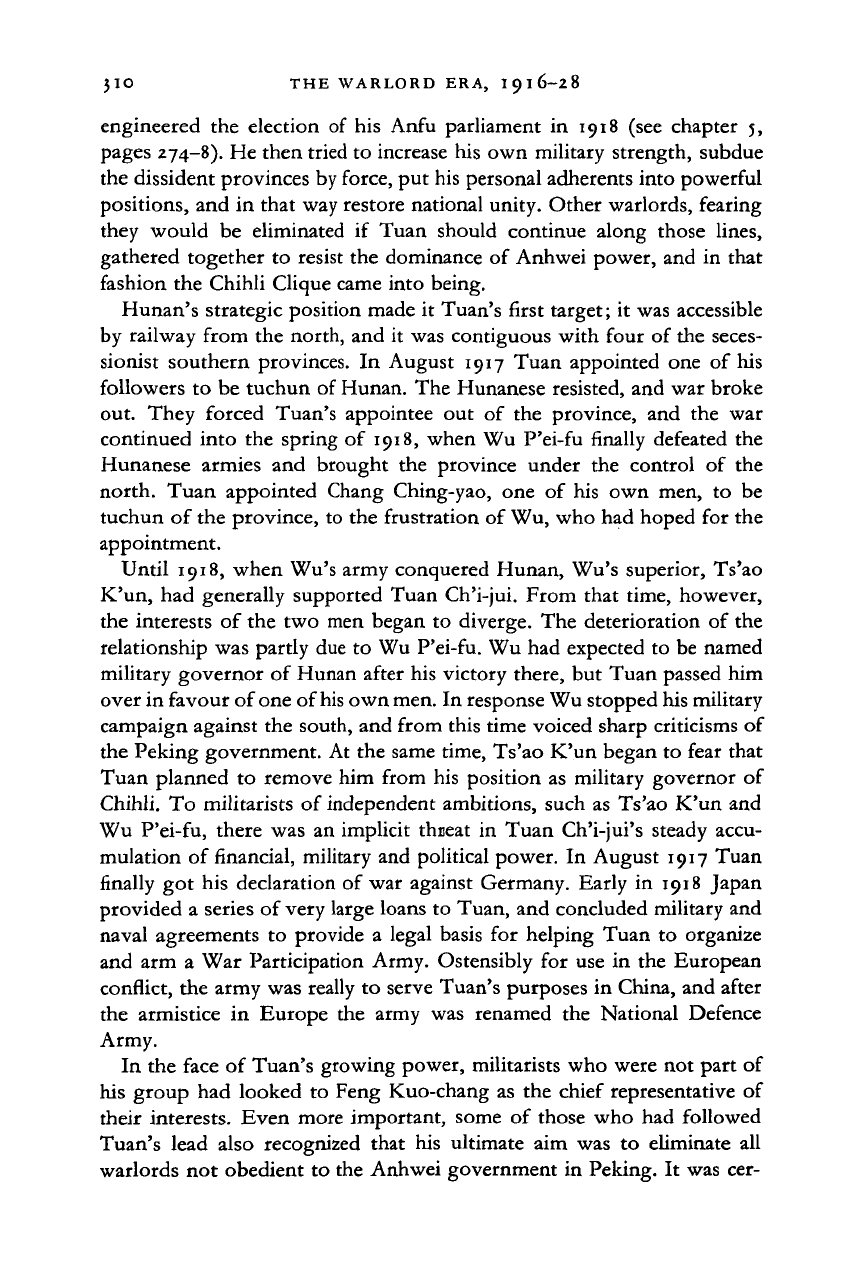
3IO THE WARLORD ERA, I 9 I 6-2 8
engineered the election of his Anfu parliament in 1918 (see chapter 5,
pages 274-8). He then tried to increase his own military strength, subdue
the dissident provinces by force, put his personal adherents into powerful
positions, and in that way restore national unity. Other warlords, fearing
they would be eliminated if Tuan should continue along those lines,
gathered together to resist the dominance of Anhwei power, and in that
fashion the Chihli Clique came into being.
Hunan's strategic position made it Tuan's first target; it was accessible
by railway from the north, and it was contiguous with four of the seces-
sionist southern provinces. In August 1917 Tuan appointed one of his
followers to be tuchun of Hunan. The Hunanese resisted, and war broke
out. They forced Tuan's appointee out of the province, and the war
continued into the spring of 1918, when Wu P'ei-fu finally defeated the
Hunanese armies and brought the province under the control of the
north. Tuan appointed Chang Ching-yao, one of his own men, to be
tuchun of the province, to the frustration of Wu, who had hoped for the
appointment.
Until 1918, when Wu's army conquered Hunan, Wu's superior, Ts'ao
K'un, had generally supported Tuan Ch'i-jui. From that time, however,
the interests of the two men began to diverge. The deterioration of the
relationship was partly due to Wu P'ei-fu. Wu had expected to be named
military governor of Hunan after his victory there, but Tuan passed him
over in favour of one of
his
own men. In response Wu stopped his military
campaign against the south, and from this time voiced sharp criticisms of
the Peking government. At the same time, Ts'ao K'un began to fear that
Tuan planned to remove him from his position as military governor of
Chihli. To militarists of independent ambitions, such as Ts'ao K'un and
Wu P'ei-fu, there was an implicit thneat in Tuan Ch'i-jui's steady accu-
mulation of financial, military and political power. In August 1917 Tuan
finally got his declaration of war against Germany. Early in 1918 Japan
provided a series of very large loans to Tuan, and concluded military and
naval agreements to provide a legal basis for helping Tuan to organize
and arm a War Participation Army. Ostensibly for use in the European
conflict, the army was really to serve Tuan's purposes in China, and after
the armistice in Europe the army was renamed the National Defence
Army.
In the face of Tuan's growing power, militarists who were not part of
his group had looked to Feng Kuo-chang as the chief representative of
their interests. Even more important, some of those who had followed
Tuan's lead also recognized that his ultimate aim was to eliminate all
warlords not obedient to the Anhwei government in Peking. It was cer-
Cambridge Histories Online © Cambridge University Press, 2008
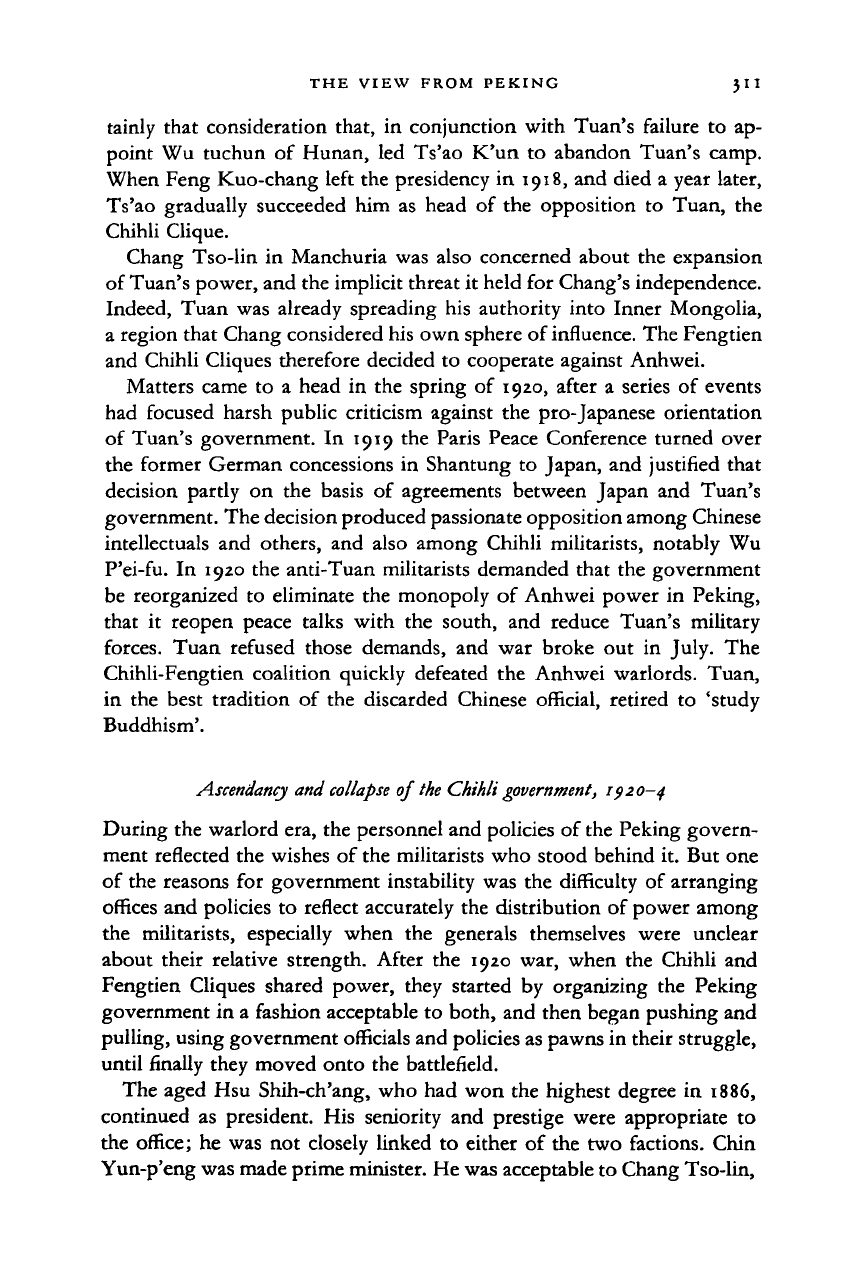
THE VIEW FROM PEKING
3
11
tainly that consideration that, in conjunction with Tuan's failure to ap-
point Wu tuchun of Hunan, led Ts'ao K'un to abandon Tuan's camp.
When Feng Kuo-chang left the presidency in 1918, and died a year later,
Ts'ao gradually succeeded him as head of the opposition to Tuan, the
Chihli Clique.
Chang Tso-lin in Manchuria was also concerned about the expansion
of Tuan's power, and the implicit threat it held for Chang's independence.
Indeed, Tuan was already spreading his authority into Inner Mongolia,
a region that Chang considered his own sphere of influence. The Fengtien
and Chihli Cliques therefore decided to cooperate against Anhwei.
Matters came to a head in the spring of 1920, after a series of events
had focused harsh public criticism against the pro-Japanese orientation
of Tuan's government. In 1919 the Paris Peace Conference turned over
the former German concessions in Shantung to Japan, and justified that
decision partly on the basis of agreements between Japan and Tuan's
government. The decision produced passionate opposition among Chinese
intellectuals and others, and also among Chihli militarists, notably Wu
P'ei-fu. In 1920 the anti-Tuan militarists demanded that the government
be reorganized to eliminate the monopoly of Anhwei power in Peking,
that it reopen peace talks with the south, and reduce Tuan's military
forces. Tuan refused those demands, and war broke out in July. The
Chihli-Fengtien coalition quickly defeated the Anhwei warlords. Tuan,
in the best tradition of the discarded Chinese official, retired to 'study
Buddhism'.
Ascendancy and
collapse
of
the
Chihli
government,
1920-4
During the warlord era, the personnel and policies of the Peking govern-
ment reflected the wishes of the militarists who stood behind it. But one
of the reasons for government instability was the difficulty of arranging
offices and policies to reflect accurately the distribution of power among
the militarists, especially when the generals themselves were unclear
about their relative strength. After the 1920 war, when the Chihli and
Fengtien Cliques shared power, they started by organizing the Peking
government in a fashion acceptable to both, and then began pushing and
pulling, using government officials and policies as pawns in their struggle,
until finally they moved onto the battlefield.
The aged Hsu Shih-ch'ang, who had won the highest degree in 1886,
continued as president. His seniority and prestige were appropriate to
the office; he was not closely linked to either of the two factions. Chin
Yun-p'eng was made prime minister. He was acceptable to Chang Tso-lin,
Cambridge Histories Online © Cambridge University Press, 2008
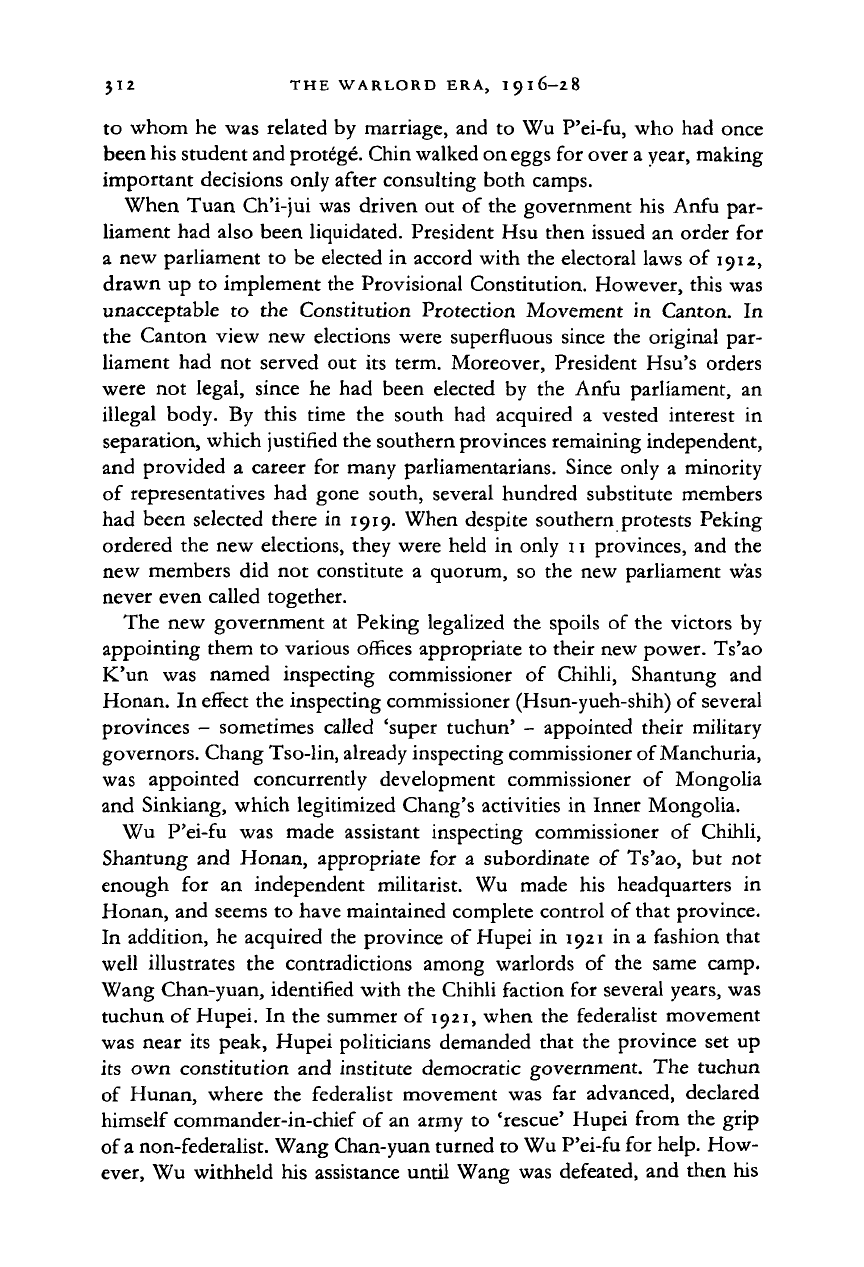
312 THE WARLORD ERA, I 9 I 6-2 8
to whom he was related by marriage, and to Wu P'ei-fu, who had once
been his student and protege. Chin walked on eggs for over a year, making
important decisions only after consulting both camps.
When Tuan Ch'i-jui was driven out of the government his Anfu par-
liament had also been liquidated. President Hsu then issued an order for
a new parliament to be elected in accord with the electoral laws of 1912,
drawn up to implement the Provisional Constitution. However, this was
unacceptable to the Constitution Protection Movement in Canton. In
the Canton view new elections were superfluous since the original par-
liament had not served out its term. Moreover, President Hsu's orders
were not legal, since he had been elected by the Anfu parliament, an
illegal body. By this time the south had acquired a vested interest in
separation, which justified the southern provinces remaining independent,
and provided a career for many parliamentarians. Since only a minority
of representatives had gone south, several hundred substitute members
had been selected there in 1919. When despite southern protests Peking
ordered the new elections, they were held in only 11 provinces, and the
new members did not constitute a quorum, so the new parliament was
never even called together.
The new government at Peking legalized the spoils of the victors by
appointing them to various offices appropriate to their new power. Ts'ao
K'un was named inspecting commissioner of Chihli, Shantung and
Honan. In effect the inspecting commissioner (Hsun-yueh-shih) of several
provinces - sometimes called 'super tuchun' - appointed their military
governors. Chang Tso-lin, already inspecting commissioner of Manchuria,
was appointed concurrently development commissioner of Mongolia
and Sinkiang, which legitimized Chang's activities in Inner Mongolia.
Wu P'ei-fu was made assistant inspecting commissioner of Chihli,
Shantung and Honan, appropriate for a subordinate of Ts'ao, but not
enough for an independent militarist. Wu made his headquarters in
Honan, and seems to have maintained complete control of that province.
In addition, he acquired the province of Hupei in 1921 in a fashion that
well illustrates the contradictions among warlords of the same camp.
Wang Chan-yuan, identified with the Chihli faction for several years, was
tuchun of Hupei. In the summer of
1921,
when the federalist movement
was near its peak, Hupei politicians demanded that the province set up
its own constitution and institute democratic government. The tuchun
of Hunan, where the federalist movement was far advanced, declared
himself commander-in-chief of an army to 'rescue' Hupei from the grip
of a non-federalist. Wang Chan-yuan turned to Wu P'ei-fu for help. How-
ever, Wu withheld his assistance until Wang was defeated, and then his
Cambridge Histories Online © Cambridge University Press, 2008
